 An open access journal
An open access journal
Industrial Internet of Things (IIoT): Transforming Manufacturing and Industrial Operations
Abstract
The Industrial Internet of Things (IIoT) is transforming manufacturing and industrial operations by connecting machines, sensors, and data for enhanced efficiency and productivity. This paper explores the significance of IIoT, emphasizing its role in optimizing manufacturing processes, predictive maintenance, and supply chain management. It delves into various aspects, including sensor technologies, cloud computing, and real-time data analytics. The discussion includes the benefits of IIoT, such as reduced downtime, cost savings, and improved product quality. Moreover, the paper addresses the challenges and considerations in IIoT implementation, including cybersecurity, data privacy, and interoperability. Through a review of industry case studies and technological advancements, the study highlights the positive outcomes associated with the adoption of IIoT, including increased competitiveness, innovation, and sustainability in the manufacturing sector.
Share and Cite
Article Metrics
References
- Al-Fuqaha, A., Guizani, M., Mohammadi, M., Aledhari, M., & Ayyash, M. (2015). Internet of Things: A survey on enabling technologies, protocols, and applications. IEEE Communications Surveys & Tutorials, 17(4), 2347-2376.
- Barlow, J. B., & Brindley, W. G. (1997). Introduction to physical systems modelling. Springer Science & Business Media.
- Ivanov, D. (2018). The Internet of Things (IoT) in the context of Industry 4.0: A survey. Procedia CIRP, 72, 939-944.
- Lee, J., Bagheri, B., & Kao, H. A. (2015). A cyber-physical systems architecture for industry 4.0-based manufacturing systems. Manufacturing Letters, 3, 18-23.
- Tao, F., Cheng, Y., Xu, L. D., Zhang, L., & Li, B. H. (2018). CCIoT-CMfg: Cloud computing and industrial internet of things-based cloud manufacturing service system. IEEE Transactions on Industrial Informatics, 14(1), 387-394.

